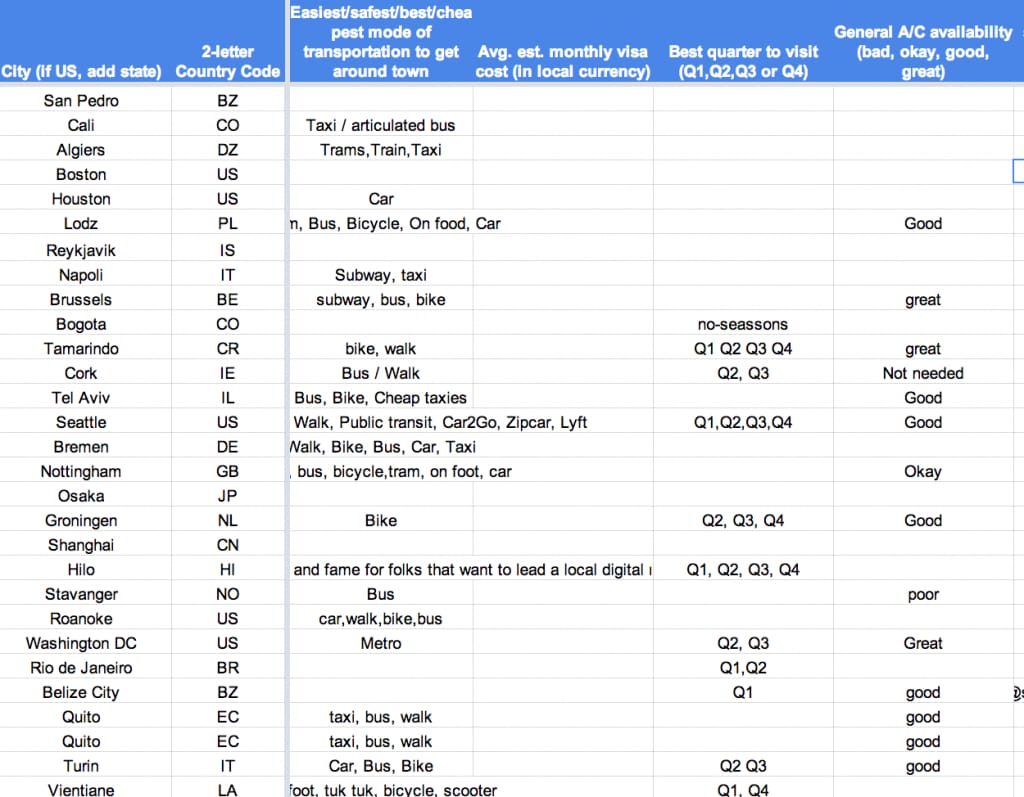- Marketer Gems
- Posts
- How a Simple Spreadsheet Became a Community-Led Growth Engine: The Nomads.com Story
How a Simple Spreadsheet Became a Community-Led Growth Engine: The Nomads.com Story
Why community-led growth beats traditional marketing
Howdy, marketer!
Back in 2014, while working from a cramped internet café in Chiang Mai, Pieter Levels had a problem that millions of remote workers could relate to: where the hell should he go next?
He was bouncing between cities, laptop in tow, trying to figure out which places offered the sweet spot of cheap rent, decent WiFi, and maybe a coffee shop that didn't blast techno at 8 AM.
The information was scattered across random blog posts, outdated forum threads, and word-of-mouth recommendations that felt like playing telephone across continents.
So Levels did what any frustrated developer would do - he created a simple Google spreadsheet.

(Source)
Within weeks, that crowdsourced mess had evolved into Nomads.com (originally Nomad List), and Levels found himself sitting on something much bigger than a travel guide.
He'd accidentally created the central nervous system for an entire movement that was about to explode globally.
Today's Treasure Trove
advertisement
Picsart Admaker: The AI that really blew my mind
I just saw something that totally broke my frame.
I tuned into the launch for the Picsart Admaker, thinking it’d be another cool AI tool, but with so much left to be desired…
Wow, was I wrong.
Finally, an AI tool for making creative look fully baked.
For performance marketers, this is a serious game changer. Uplevel your ads and push them out even faster.
When Community Becomes Your Growth Engine
The story of Nomads.com reads like a masterclass in community-led growth, but not in the way most business books would teach it.
There was no grand strategy, no perfectly orchestrated launch sequence, no influencer partnerships.
Instead, Levels stumbled onto something more powerful: he solved his own problem so thoroughly that thousands of people with the same problem couldn't help but participate in the solution.
When people found a tool that could tell them whether Tbilisi had reliable internet or if Mexico City's cost was actually affordable, they didn't just use it - they contributed to it.
This kind of organic growth is increasingly rare in our attention economy.
Most platforms have to manufacture engagement through notifications, gamification, and algorithmic manipulation.
But Nomads grew because it genuinely made people's lives better.
The community aspect became self-reinforcing in ways that traditional marketing could never replicate.
As more nomads contributed data, the platform became more valuable, attracting more users.
This virtuous cycle created what economists call network effects, but it felt more human than that - it felt like being part of something bigger than yourself.
The Power of Solving Real Problems
What made Nomads.com explosive wasn't just the community dynamics - it was the timing.
The pandemic would later accelerate this trend dramatically, but even in 2014, the writing was on the wall.
Companies were realizing they could access global talent pools, workers were questioning whether daily commutes were worth sacrificing their twenties and thirties, and technology was finally good enough to make location independence practical rather than just aspirational.
But timing in business only matters if you're actually solving a real problem.
Levels wasn't trying to create demand for digital nomadism; he was responding to demand that already existed but was underserved.
The genius of the platform wasn't technological - the early version was basically a website wrapper around a spreadsheet.
But, by organizing nomad-relevant data in a searchable, comparable format, Levels created something that was exponentially more valuable than the sum of its parts.
This points to a broader lesson about community-driven businesses: the most successful ones don't try to create new behaviors; they make existing behaviors easier, more efficient, or more enjoyable.
People were already trying to find good nomad destinations, already sharing recommendations, already building informal networks.
Nomads.com just gave them better tools to do what they were already doing.
When Levels accidentally launched the site (he'd literally uploaded the wrong configuration file to his server), it hit #1 on both Product Hunt and Hacker News on the same day.
The platform's growth strategy, if you can call it that, was beautifully simple: make something useful, let people find it, and give them reasons to stick around.
Customer acquisition costs were essentially zero.
User retention was high because people weren't being tricked into using something they didn't need - they were solving actual problems.
And because the community was contributing the content, operational costs stayed low even as the user base exploded.
The MRR of Nomads.com is $35,000.
Building an Ecosystem
What's fascinating about Nomads.com's evolution is how it grew beyond its original scope without losing its core identity.
The platform became more than a city ranking site - it evolved into a comprehensive ecosystem for nomadic workers.
This expansion wasn't the result of feature bloat or trying to be everything to everyone.
Instead, each new feature addressed real needs that emerged from the community.
When they needed jobs that accommodated their lifestyle, Levels launched RemoteOK, which became one of the largest remote job boards on the internet.
This organic expansion illustrates a key principle of community-driven growth: let your users tell you what to build next.
Traditional product development often involves expensive market research and user testing to figure out what features to prioritize.
But when you have an engaged community actively using your platform, they'll tell you exactly what they need next.
The key is listening to the signal through the noise.
Wrap Up
The transformation from spreadsheet to multi-million dollar platform didn't happen because Levels had a grand vision for disrupting travel or revolutionizing work.
It happened because he solved his own problem well enough that other people wanted to be part of the solution.
The lesson isn't to quit your job and start a spreadsheet-based business.
The lesson is that the most sustainable growth often comes from serving communities that already exist rather than trying to manufacture new ones.
Sometimes the best business strategy is just being genuinely helpful at scale.
✌️,
Tom from Marketer Gems

